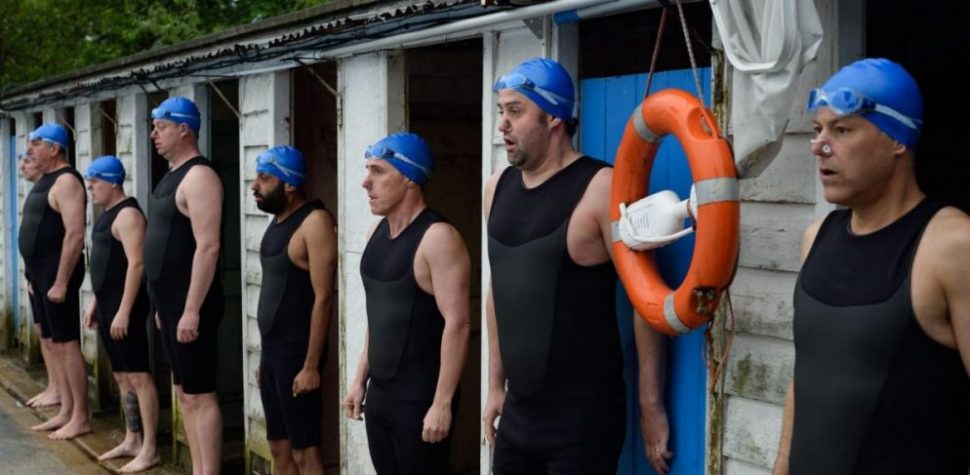| Worth seeing: | as a perfectly likeable but thoroughly unbelievable midlife crisis that sees an unsatisfied and jealous accountant seek solace in a synchronised swimming team |

| Director: | Oliver Parker |
| Featuring: | Rob Brydon, Adeel Akhtar, Aschlin Ditta, Charlotte Riley, Chris Jepson, Christian Rubeck, Daniel Mays, Jane Horrocks, Jim Carter, Nathaniel Parker, Robert Daws, Ronan Daly, Rupert Graves, Spike White, Thomas Turgoose |
| Length: | 97 minutes |
| Certificate: | 12A |
| Country: | UK |
| Released: | 6th July 2018 |
WHAT’S IT ABOUT?
Middle-aged accountant Eric (Rob Brydon) is going through a midlife crisis.
At home, he’s worried that his wife Heather (Jane Horrocks) has lost interest in him since she became a local councillor. At work, he’s becoming increasingly disconcerted with the depths to which his smarmy boss (Robert Daws) is prepared to go to cut their client’s tax bills.
His only release is his regular trip to do lengths in the local pool, where he falls in with a group of similarly disenfranchised men, who’ve formed an unlikely bond to escape from their own issues; they’ve set up a men-only synchronised swimming club.
A chance encounter leads to the group signing up to the unofficial world championships, which gives the men something else to put their energy into.
For some, it’s just their pride on the line – for others, it’s a chance to chase their ghosts – and for Eric, he’s hoping that success in the pool will win back his wife and son and get his life back on track.
WHAT’S IT LIKE?
Inspired by a documentary about a group of Swedish men who did pretty much the same thing, the same set of producers have delivered the type of gentle British comedy that would probably be more comfortable – in the terms of content, at least – on the small screen than in cinemas.
It’s true that there’s some effective and impressive underwater photography that almost warrants the price of the cinema ticket but the spectacle of Jim Carter, Daniel Mays and Rob Brydon waving their wobbly bits on the big screen is probably not something that would encourage most audiences to seek the biggest possible picture. Rupert Graves, on the other hand…
In the two decades since The Full Monty put a group of downtrodden men into a humiliating situation to better themselves, a whole host of British films have inhabited the same fertile territory, but while many of them have had political undertones, counter-intuitively, Swimming With Men doesn’t really get beneath the surface.
The group could have been devised by an “downtrodden underdog generator” – Jim Carter is struggling to learn to live with the grief that came from the recent death of his wife, Rupert Graves is trying to rebuild his pride after his wife left him and turned their children against him, Daniel Mays still can’t come to terms with the anxiety attacks which scuppered a footballing career, Adeel Akhtar’s gay dentist has constant problems with his other half, Thomas Turgoose is always getting into trouble with the police and Rob Brydon displays every sign of midlife crisis except the fast car.
Then there are the other two. Silent Bob – who, as his moniker might suggest – particularly to anyone familiar with Kevin Smith’s character of the same name – is silent until his final scene…but is it worth the wait? And the New Guy – well, that’s all we ever find out about him – he was once new.
This plays into one of the other film references, in which Rob Brydon’s bare belly would be replaced by Brad Pitt’s; it probably won’t come as much of a surprise that one of the rules of Swim Club is that you don’t talk about Swim Club – another is that like any other man, you don’t talk about your problems – you just practice the routines and get on with your life.
But it makes you wonder why on earth they didn’t just have a team of six – there are six strong characters and two cardboard cut-outs who serve no purpose, in terms of helping their team-mates, helping themselves or simply developing the plot.
The film has its moments, with Rob Brydon doing his best to help others as he helps himself, but most of the narrative unfolds in the most formulaic of fashions – the alcohol-inspired door-step melt-down of a jealous husband – the last-minute dash to the airport – the nail-biting wait for the results of a competition – the efforts of a local councillor to try to fight library closures – well, they have to give Jane Horrocks something to do to take her mind off her somewhat self-absorbed husband.
The talented cast deliver the clunky dialogue far more eloquently than it deserves and their charming performances bring warmth and gentle humour to an otherwise humdrum tale.
As if the story itself isn’t unbelievable enough at every turn, when it reaches what feels like the ending, the Third Act coda neatly ties up the loose ends in the most implausible and irrelevant way.
For a film about a group of troubled men who spend most of their time below water, there’s simply not enough depth to the characters or credibility to what they do.
And while the humour – obvious as it often is – rarely gets embarrassing, there’s an oddly uncomfortable moment for the #MeToo era which, frankly, left me a little stunned. Whatever you think of what this character does – taking someone’s perfectly uplifting advice to be himself and go for what he wants – it’s almost unbelievable that any film-maker could have thought it a good idea to take this notion in the direction that they do, in the interests of comedy, or even pathos, while Harvey Weinstein is sitting under house arrest awaiting trial, accused of forcing himself on women.
